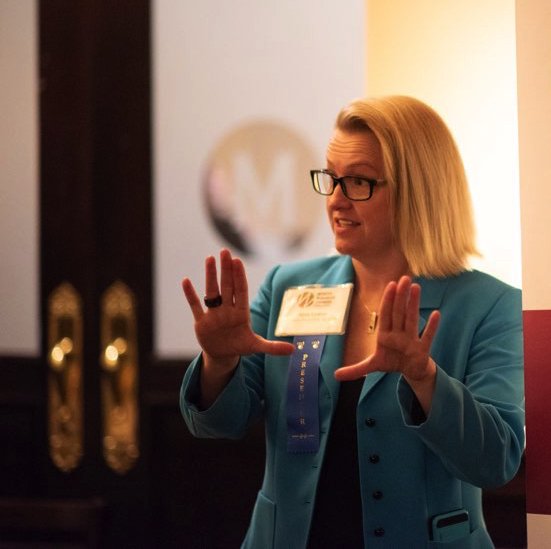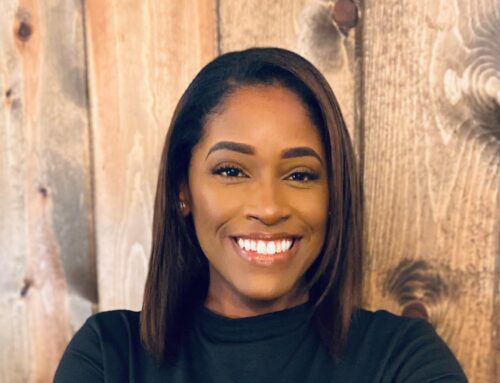I had the pleasure of chatting with Gina Cotner, who has a team of top notch Virtual Executive Assistants at her company, Athena Executive Services.
We talked about the differences between a virtual and on-site assistant, how to get clients if you’re a VA, and how to set yourself apart as a high-performing EA.
If you’re a VA, or are considering becoming one, this episode is especially for you.
LEADERSHIP QUOTE
Instead of looking for a great leader, we are in an era where each of us needs to find the great leader within ourselves.
– Werner Erhard
About Gina Cotner
Gina Cotner is the founder and CEO of Athena Executive Services, a firm that pairs virtual Executive Assistants around the United States with busy business owners, entrepreneurs and executives. Her team of high-caliber Executive Assistants work part-time, from home, taking many administrative tasks and projects off the plate of successful people, leaving them free to spend their time where they are needed most.
She, herself, has worked remotely for over 10 years on national and international teams. For the last 5 years she has been focusing on the work-life balance, wellness and satisfaction of busy professionals.
She is masterful at living from her calendar and coaching others in how to have their calendar be the canvas on which they paint their life. Her coaching on time management (and how we relate to “time” altogether) leaves people as the author of their day and their week, rather than having to be heroic and simply survive what’s coming at them.
She was born and raised in the Seattle area. After earning her dual degree in Human Resources and Public Relations, she went on to have her career center around training and personal development. She has also led seminars for one of the world’s leading Personal Development organizations. Currently she spends 75% of her year living and working in Seattle, and 25% of her year in Pismo Beach, CA.
CONNECT WITH GINA
SUBSCRIBE
Subscribe to The Leader Assistant Podcast so you don’t miss new episodes!
You can find the show on iTunes, Spotify, Google Podcasts, and Stitcher.
Join my email list here if you want to get an email when a new episode goes live.
JOIN THE COMMUNITY
Join the Leader Assistant Facebook Group here for bonus content and to network with other assistants who are committed to becoming leaders!
LEAVE A REVIEW
If you’re enjoying the podcast, please take 2 minutes to rate and review the show on iTunes here. Each review helps me stay motivated to keep the show going!
—
EPISODE TRANSCRIPT
Gina Cotner 0:00
Well, I’m Gina Cotner I’m the CEO of Athena executive services and today’s leadership quote is from Warner Earhart. Instead of looking for a great leader, we are in an era where each of us needs to find the great leader within ourselves.
Podcast Intro 0:19
The leaders that’s it podcast exists to encourage and challenge assistants to become irreplaceable, Game Changing leader assistants.
Jeremy Burrows 0:29
Welcome to Episode 21. Thanks for tuning in to The Leader Assistant Podcast today I had the pleasure of speaking with Gina Cotner from Athena executive services, which is a firm that pairs virtual executive assistants around the United States with busy business owners, entrepreneurs and executives. Her team of high caliber executive assistants work part time from home taking many administrative tasks and projects off the plate of successful people, leaving them free to spend their time where they are needed the most. We had a great conversation talking about virtual assistants, and finding clients and what it means to be a high performing EA. So I hope you enjoyed the show. But before we get started, make sure you join our Facebook community at Facebook.leaderassistant.com. And also the show notes for this episode will be at leaderassistant.com/21 Hey, everyone, thanks for tuning in to The Leader Assistant Podcast today. I’m with Gina Cotner From Athena executive services. Hi, Gina. Thanks for joining me.
Gina Cotner 1:36
Hey, Jeremy. Thanks for having me.
Jeremy Burrows 1:38
So I’m going to kind of start off with talking about the virtual assistant world. What would you tell an executive assistant who wants to become a virtual assistant?
Gina Cotner 1:51
I mean, when we say what would you tell an executive assistant worse are you assuming that’s an executive system that drives to the office every day?
Jeremy Burrows 1:58
Yeah, yeah. The traditional you know, in office?
Gina Cotner 2:01
Yeah.
Jeremy Burrows 2:02
Personal executive,
Gina Cotner 2:03
right
Jeremy Burrows 2:03
administrative? Yes, yes.
Gina Cotner 2:05
Yeah. You know, I think there’s a couple big things. One is really, you know, do you want to work from home? Which sounds sort of silly, because it’s like, well, who doesn’t want to work from home? Except, that is not a good environment for everybody. So I think people have to really look and tell the truth for themselves. Do I want to work from home? Does my home work for that? Do I like working alone? Can I drive myself independently sitting there at my dining room table with my cat, or whatever? You know, so I think that’s one big thing. It’s a, you know, working remotely is a style of work. And yes, it’s very, very popular. And many, many people kind of dream about it, like, oh, one day, I’m not gonna have to do this dang commute. And I’m not gonna have to work around a bunch of other people. Except for some personality types. Dots, the office is a great environment. So you got to look and see is your environment that you’d be putting yourself in as a quote unquote, VA Is that can you be highly productive in that environment? Or are you going to be lonely or bored or distracted? Or, you know, many, many things that can happen? So I think that’s the biggest thing, I think the other big thing is, do you want to market yourself? I mean, it depends on what kind of VA you’re going to be. But if you’re gonna leave your corporate job, and you’re gonna sit at home at the dining room table, who’s gonna hire you? And do you want to be in the business of finding clients? Because that’s a whole different skill set, then I think most EAs are just naturally going to have. And I think, you know, when I’m onboarding people in my company, I’m we’re always looking at that, can you deliver excellence when nobody’s looking? Nobody’s there, nobody’s around. Nobody. Your knowledge just up to you. It’s on you. So those are some things I would tell any EA, who’s considering becoming a VA.
Jeremy Burrows 4:14
So how do you find clients for your V virtual EAs? And how maybe that would that translate for somebody that’s just kind of on their own trying to find clients?
Gina Cotner 4:29
Yeah, I think it does translate how I started is what I would tell people how to start. I started with my own network, with what I would say where I already had street cred, where I already had credibility. So former co workers, former bosses, former managers, people, I volunteer a lot. So people I volunteer with who know me in that way, friends, family, I let the whole wide world know what I was doing. And it’s For the most part, they’re like, Oh, of course, you’re doing that, that makes perfect sense that you’re doing that. And if you’re a good EA, and you’re gonna go out to be a VA, your community would say that they’d go, Oh, of course, you’d want to do that. So there should be places where there’s a lot of credibility. And then I have I built with the help of my business coach, I have a great sales process that doesn’t make me feel salesy. So I do a certain amount of outbound marketing every month. But truthfully, who I’m talking to now, and who comes on board these days, I’d say in the last 12 to 18 months, everybody who’s come on board as a client is a referral. But that’s the only because I spent the first two years just really getting the word out there to everybody. I didn’t care whether it was my cousin, or my uncle, or my former boss, or I, you know, and some people feel uncomfortable doing that. But if you have a good process for how to do that, I think that makes a big difference. And by process for me is means that I don’t assume everybody I’m talking to needs a VA or an EA. But I assert, you might bump into somebody who does or you might know somebody who’s overwhelmed and overworked. Hey, if you do and you want to help that person out, I could be the answer. Yeah, so I’m gonna got the word out that way. That’s great.
Jeremy Burrows 6:21
So should virtual assistants specialize? Or should they be more jack of all trades? Or Jane of all trades?
Gina Cotner 6:31
All right, Jack, and Jane, you know, I think there’s really a good argument for both. If I had to put my money down on something, I’d say, jack of all trades. But that’s because I come from that your trade is being an executive assistant. So a lot of times people will come to me and say, Well, do you guys do social media? Do you do this? Do you do travel planning do do expense reporting? Are you good at this? Are you good at that? And I’m like, listen, yes. But what we’re good at is being in executive assistant. So and a great executive assistant may not have every single skill for the next project coming down the pike, they might even outsource it. So, you know, for me, part of the EA, what makes an EA a little different is that they are an executive assistant. So they’re sometimes they’re overseeing projects. Sometimes they’re becoming project managers. So they’re smart enough to go you know what, you don’t want me to make that PowerPoint, or you don’t want me to do that part of the project. I’m going to outsource that. Yeah. So I, you know, I think if we’re mastering our craft, the craft we’re mastering is being an EA more than and yeah, it’d be really great if you knew all the latest project management software and the amount of pixels for the photo that goes on the LinkedIn post, but maybe you don’t. IT’s okay.
Jeremy Burrows 8:03
Yeah. Yeah, it’s kind of the figure it out Part. That doesn’t mean that necessarily, you have to figure it out. But that means that you have to figure out who can figure it out
Gina Cotner 8:14
Yeah, like in our mission in my company, there’s this one line, and it says, not knowing how is not an issue.
Jeremy Burrows 8:21
Yeah.
Gina Cotner 8:22
So what you don’t know how, okay, well figure out how that’s gonna get done.
Jeremy Burrows 8:27
So can you share a couple tips for managing multiple clients or multiple executives, as a virtual EA?
Gina Cotner 8:39
Man, I just share from my view, this may not work for obviously, for everybody, but I think you’ve got to work with the way your brain works. And there’s a lot of science out there, right, that says multitasking is bad, and you got to be focused. I don’t know what the truth is. But I think you know, you everybody listening and anybody who’s a VA or an EA you know how you work well. And I’m a big fan of time blocking. I don’t want my team working with my clients. I don’t want them to be in three different people’s worlds in the same 20 minutes. Yeah, want you to give the best you’ve got for this one client for the next hour, then maybe take a break, I don’t know, do a load of laundry. Something sit back down now sink your brain into this other client now partly because my clients are all all over the variety of industries. So an EA on my team might have a lawyer and a financial advisor and a naturopathic doctor that might be there three clients and to sink your brain into each of those different human beings worlds and those different industries and to try to switch gears to quickly throughout the day, I think is crazy making and I think it reduces the level of excellence and that’s what I’m always after as the CEO Is, is our level of excellence high across the board. And I think my belief is that what makes people really excellent at what they’re doing is they’re really present the present to this entire travel itinerary that they’re building for this human being. And is it makes sense? Are they going to be able to eat? Are they going to be able to breathe? Are they going to be able to arrive at the meeting like they floated in on a magic carpet? Or is it going to be? Are you building an insane itinerary because you are distracted, because you’re responding to this text from this client. And oh, this badge just popped up. I’m a big fan of shut off lots of notifications and lots of badges. So you can just really focus and do awesome work for this client, and then stop and go do awesome work for, you know, client number two. So I don’t know that that’s works for everybody. But that’s my current philosophy.
Jeremy Burrows 10:54
Yeah, I use time blocking religiously. And, you know, I have an ideal week calendar set up for my boss and I, yeah, I’m on the same page. I think that’s it’s crucial. Even if you work differently, if you have a different style of work than me, I still think that it’s helpful to do the time blocking. And so definitely worth a shot. So what about if you’ve got, let’s say, your a VA, and you’ve got three or four clients or executives that you’re working for at the same time, and you’ve got the time blocks, so you know, you work on this client stuff for an hour, and then you switch over to the other clients. But in the middle of one of those hours, one of the other clients calls with an emergency, how do you kind of help your team handle those kinds? And how do they prioritize this client emergency over the other clients emergency? You know, maybe they call it the exact same time?
Speaker 1 11:48
Right, right. Well, we are part time. So people are hiring our firm for say, 10 hours a week, or 15 hours a week, or 20 hours a week. So one thing that just inherently they have to understand and it does take some training, because people want what they want when they want it. But we’re not a 40 hour a week resource. So you don’t that 10 hours a week that you’re getting doesn’t mean that Allison is on call for you eight hours a day, right? And she’s logging 15 minutes here in 10 minutes here and 10 minutes here. No, no, no, she’s not an on call resource for you all day long. So it is. It is something where we have to work hard to set a really good precedent in the beginning, which is tricky, because any great EA wants to jump when somebody says jump there, like they want to tend to that emergency. And I would say my team, if they think they can stop what they’re doing without too much, you know, damage or impact and go handle that emergency? Of course they will. Because it does make us than all that much more valuable. But I’m always training my EA team in you got to watch what kind of precedent you set. So if you respond to that text at seven o’clock at night, let me tell you, they’re gonna want that all the time. And it’s hard to put that toothpaste back in the tube. So we get but it’s tricky, because when they’re brand new on my team, they’re also very eager, like, Yes, I can do anything, anytime, anywhere. And then a couple months later, they’re like, why are they texting me at eight o’clock at night? And I’m like, well, because you responded, that worked. Once upon a time, you haven’t created a world with them, where that’s not what you want. Or it’s fine that they text you I’m a big fan of clients delegating work all the time. That doesn’t mean you have to respond, it doesn’t mean you have to have a badge on your phone remind, you know, telling you, that’s up to you what you do with what’s coming at you. So long answer to that.
Jeremy Burrows 13:58
is it do you think that it’s easier to move from a traditional in the office assistant job to a virtual remote job or vice versa?
Gina Cotner 14:11
You know, I’m so tainted because I only know the only know the One Direction really is having been in EA in an office or at least having been an office worker for a long time having that dreamy thought, oh, I want to work from home and then becoming somebody who worked from home. I think once people get the lifestyle of working from home and they decide that works for them. They don’t ever want to drive to an office. And I would say that of my entire team. I think my entire team would chew off their right arm before they had to get in a car and sit in traffic and go to an office. Yeah. So that’s a lifestyle. I mean, is it easier I don’t know which one’s easier or harder. I love that people have had an in Office experience. because many ways you’re trying to replicate that in a virtual world. So you if you have never worked in an office where there was a water cooler or a kitchen where you got your coffee on Monday, and you said, Hi, how was your weekend? Oh, really? Hahaha. And you had a little chit chat, then I don’t. I don’t know, maybe the younger generations get that some other way. And they just translate it in the virtual world. And they know that it’s a social graciousness on Monday on that video conference to say, Hey, everybody, how’s your weekend?
Jeremy Burrows 15:35
Yeah, I think it’s gonna be interesting to see what happens with the kind of the next generation because there’s this whole VA craze has, has been pretty, pretty hot.
Gina Cotner 15:49
Yes, crazy is a good word for it.
Jeremy Burrows 15:51
And I think it’s going to be interesting to see, you know, in the long run, how many of those kind of started that way. And then if they struggle, or they realize, oh, they they have kids now, and they have to, they need insurance, and they need you know, they’re, they’re really struggling to get clients and having to go into the office setting. I think that’s gonna be interesting to kind of see how that this whole world plays out. But I do think that the interesting point about, you know, maybe the younger generations with technology, they’re already kind of, even if they’re at school, or they’re at their retail job, they’re on their phones, texting their friends. And so, you know, they’re kind of, they’re kind of used to the virtual world,
Gina Cotner 16:36
right? I mean, you’ve got to learn to work on a team. I happened to learn it in an office, but that’s just my generation. And you’re right, they learned have learned and are learning how you’re going to operate as a team, even though you’re in all different countries, all different cities. Doesn’t matter. Very, very possible. Yeah, it’ll be interesting to see what the next generation teaches us yet again.
Jeremy Burrows 16:58
Yes. So what was your very first job?
Gina Cotner 17:03
Oh, my first job job after babysitting after I learned I was not a good babysitter. At my first official job, I’d say with the official kind of paycheck, where taxes were taken out was I was a grocery bagger at Safeway. Safeway is a, I’m born and raised in Seattle. So Safeway is a store brand in California, people call it Vons. I don’t know, probably part of the Kroger family. So that was my first job actually remember going to training and I had to learn how to put groceries in a grocery bag in a way that really, really worked. And I still sometimes shop at the very safeway that I bagged groceries out when I was 15.
Jeremy Burrows 17:48
Did you learn how to do the, Don’t put soap in with the food?
Gina Cotner 17:53
Yes
Jeremy Burrows 17:53
kind of stuff. Yeah, I worked at Walmart. So I know.
Gina Cotner 17:57
You got to box out the bag box out and just put some protection around the outside with like a cereal box and a cracker box. Yeah.
Jeremy Burrows 18:03
So what? What kind of skills in that job? Other than the grocery bagging? Obviously, what kind of skills did you learn in that job that are they’re still using today as you run your own company?
Gina Cotner 18:18
Oh, my gosh, I was 15. I think when I had that job. Oh, you know, what I think was great. And I would say this about a couple other jobs I had is it was super corporate. And I know a lot of people don’t, you know, I don’t want to work for a big corporation. But man, I learned so much when I worked there. And I spent seven years at IBM and I learned a ton being in a big corporate organization. So you know, you got to show up on time, and you had to fill out your time card. And we just very regimented which really helped me, you know, and there were reviews. And here’s when you get raises, and here’s what you get in trouble for and it was just it was very black and white. And it was great. I so I kind of I love that. I think that that made a difference for me to know. Okay, yeah, you can make some friends at work and go to the holiday party. And there are some rules to follow. Right. So great. Yeah,
Jeremy Burrows 19:12
I did. I do. Remember working at Walmart, you know, just the concept of, we actually had to clock in like, we had the little swipe badge or whatever. And, yeah, it’s like your three minutes later, like, ah, you know, and nowadays, it’s like, oh, you know, so and so’s 15 minutes late to this meeting. That’s normal. You know, it’s just definitely a different different different times a different world. Yeah. So what’s the number one struggle that you see assistants have?
Gina Cotner 19:45
A little bit like we were talking about before is setting the expectations, resetting the expectations. Because you get the expectations or the way we’re going to work together. either ironed out and eventually it gets tested. Or oh, it really worked until someone went on vacation or that really worked until you had me do this kind of project and then the, the system, the way we work together starts to break down and you got to create a new system. So I think that’s one of the real tough parts. And it’s not easy to be really good at that. But I think that is something for EAs and VAs to get good at like, is to learn from, hey, that thing we did last week, that didn’t really work really well. So here’s what I got from that. I’ve got to stop doing X and start doing y. And then this is my request of you just always be tending to the relationship. And that’s the hard part. The work is the easier part. I mean, yes, there’s hard work to do. But having that relationship and the expectations on both sides of the relationship, calm, constantly being ironed out, right, like a marriage. You know what worked in the first two years, it doesn’t really hold up in year five and six, not a problem. And I mean, that’s the biggest thing, I think, too, is to just not make any of it wrong. Like it shouldn’t be this way. Oh, no, maybe this is what happens in year three with an executive in a relationship. Ah, let me go discover something. Let’s go create something. You know, I talked to my team, twice a month. So I am mainly what I am interested in is what isn’t working or where they are frustrated. And they’re pretty, you know, transparent with me. They’ll be like, ah, Gina, this inbox, I’m gonna kill them. And I’m like, okay, but do you know, that’s why they have you? You know, a lot of my job is just keeping my team empowered in the face of those frustrations. I’m like, I got it. But you know what, that’s why they have you. Yes, it’s a mess. You bet. It’s a mess. That’s why they have you job security. Yeah, and you go get that mess ironed out. And hopefully you become you create a really amazing email system for them. And then we’ll move on to the next mess. Yeah. Yeah, I think that I mean, it’s, whether you’re an EA or a VA, I think it’s just a deal for human beings. Right? We have some notion like, well, it shouldn’t be this way. I know. But it is right now. So what are we going to do now? Yeah.
Jeremy Burrows 22:19
So you’ve talked a little bit about a few things that I think separate the high caliber EAs, from the non high caliber is, What’s What’s something else that you might share that You know, because I get this a lot, you know, I’m an assistant I do, I schedule the meetings, I, you know, get the coffee, whatever. And then it’s like, I want to take it to the next level. But I don’t know where to start. Or my my executive asks me to kind of step my game up. Yeah, where do I start?
Gina Cotner 22:52
high performing EAs. And this may not happen tomorrow. This is an overtime thing that I think there is to grow into, but you get, quote, unquote, get you really get the executives world. And you consider yourself an equal to the executive now, are you the CEO? No. But you are the expert at what you’re an expert at. And they’re an expert at what they’re an expert at. And these two experts come together and create magic. I mean, I don’t mean to be weird, but it’s like, that’s where the magic happens. And all the like, oh, my gosh, we’re amazing, is when the EA is really being like, Listen, I’m an expert in the world of calendars and inboxes, and social media and expense reporting and workability. Okay, and you are a cosmetic surgeon, or whatever your job is, you know, you’re an expert in that as, as opposed to, and it’s a subtle difference. Like, I don’t know, the fly on the wall may not be able to see a difference in what’s happening physically, but it’s a way of being that changes that who I’m being as an EA is, I’m your shoulder to shoulder partner. I got your back. Not I’m waiting for the next task to do and I hope I do it really well. And I and you like me. So I think it’s an elevation for the EA in who they are for themselves. And I think every EA comes from some place of being of service, they are a person who is born to be of service wants to be of service, that’s their complete self expression to be of service. They enjoy that they revel in that so I think that’s always running in the background. But a high like when my team is really like they are every now and then they boss, the boss. You know, they boss the client, really graciously, really kindly. Ultimately, we’re not the umpire, but to have the confidence to say, hey, hey, hey, hey, hey, I noticed you keep blowing off yoga. Why are you pulling off yoga? Yeah, oh, I got this and this and this and this, okay, well, we’re gonna design something else. Because listen, you’re I’m going to be a stand about this, you’re getting into yoga, we’re not having you get run into the ground. I’m not sending you home to your wife every night exhausted, here we go. Like it’s being willing to intrude. Because you’re an expert in something I often say my crew is like the bodyguard of the calendar, and who were mostly body guarding it against is the executive themselves. You know, so we’re a stand for that human beings life working, not just that the newsletter got out. And the newsletter needs to get out. And it needs to get out awesome and on time. So it’s just a higher level of what you expect from yourself. I think one way to get yourself there to is to get interested in what are the goals of the executive? What are their quarterly goals? What are their annual goals? How is that going? What do they need? Do they do they keep saying they’re going to produce XYZ, but you don’t see any occasions on the calendar, that show where they’re going to be doing that critical thinking or that strategic planning, then you can be an asset and go Well, George, when are you? When are you going to do this work? I mean, you’re slammed for the next three weeks. Oh, we should rearrange some things. Okay, good. I’ll go to work on that, like you could be the voice for how are these goals going to get achieved, even though you’re not the expert, you’re not the doer. But you are, listen, my boss is going to win on my watch, my boss is going to win. And here’s where he’s not winning. And I’m going to see what I can do about that. You know, I think ultimately, when you’re operating as a high performing EA, what I notice the client say the executives say kind of the common phrase over time, is they say, Wow, somebody’s got my back. And I think that’s when you know, you’re kind of there, you’re shoulder to shoulder partner with somebody I got their back. You know, I’m gonna stop letting their calendar get messed with. Why because I got that person’s back.
Jeremy Burrows 27:16
So if you’re an executive looking for to find somebody who’s got your back, what, what is kind of the best way to find that? What’s the best way to find an assistant that’s got your back?
Gina Cotner 27:31
I’m trying to figure that out myself right now. I just emailed you about that yesterday. I think I you know, we’ve been around for three years, my firm, and we are that. I don’t know where else that exists. I’m sure it does. But I just one of the newest clients I just signed, he said, You know, I’ve had these different VAs and they’re fine, but something’s missing. And then I started talking to my other CEO friends, and they told me what I need is an EA and I realized the difference between an EA and a VA. Now, a Va certainly could be a high caliber EA everybody. I think people your audience understands that the CEOs out there in the world don’t necessarily understand that. But he got the distinction, oh, I could have people I pay less to and do lower level activities. And I could have this other layer called an EA. Now I’m on the quest to answer your question, which is alright, where did those people go looking? Like I can’t quite I haven’t figured out quite yet how he found us. And are there big VA firms out there that maybe did they have a corner pocket of their company that’s a division called Hey, this is the high caliber division, you’re gonna pay more, you’re gonna get a maybe older, wiser, higher level of business acumen higher level of polish and professionalism over here in this division, maybe that exists. And it’s not to be little, the lower level because I think that’s important too. But you’re right, where do people go find this? I’ve got your back on equal to you kind of EA I’m not exactly sure.
Jeremy Burrows 29:19
Yeah, I’m actually interviewing Brian miles, who’s the co founder CEO of Belay Solutions formerly EA Help. Yeah, him and I have gotten to know each other a little bit over the years. And you know, one thing that I noticed when I was in between jobs, I was debating becoming a VA and I actually signed my first client for a month and realized I didn’t really want to do this because I’d have multiple bosses instead of just one. And so anyway, I I looked at their stuff and looked at potentially applying and I noticed that their requirements, you know, to apply to be a virtual assistant contracted virtual assistant for them. The requirements were pretty similar to the EA jobs that I was looking at. And so that was kind of an interesting way, that it’s that they kind of stood out from these other VA services that I had found, you know, three, four years ago. But yeah, it was like require, you know, four to five years plus of executive assistant experience required or something like that. And at the time, and, and I just remember seeing that four or five year number on general EA job descriptions. Oh, okay. All right. So anyways, if you could snap your fingers and instantly give all assistance, more of something, what would it be?
Gina Cotner 30:41
Well sure that it all, like more time, but let’s see. I think more boy, what is the word for it? Um, peace of mind. I think really might be it like, the more more of that characteristic, or that personality type that just doesn’t take anything personally. You know, it’s like, oh, it’s raining out and you’re upset, and you’re angry, and you’re annoyed. And the sun’s shining? Like, it’s just like, what’s my point? My point in that is that it’s that assistants not get so impacted by what’s going on around them in an emotional or mental way that they can just be the rock, they’re the calm in the storm. They’re the like, oh, okay, that flight got canceled. I got it. All right, well, here’s what we’re, you know, it’s not emotional. And a lot of breakdowns that are going on around them are not at all about them. So whatever, I infused that into everybody, I want more of that everybody wants more of that.
Jeremy Burrows 31:56
I love that I talked about confidence. And I talked about or one of the best ways to get confidence is to remember that no matter what you do at work, or how your executive thinks that you’re doing, or if you make a mistake, or whatever, no matter what, you’re still a valuable human being. And so that it reminds reminding yourself of that can really help bring that confidence and that peace of mind, like you’re saying. And one thing that’s you know, if you’ve mentioned the calm in the storm, there was one of our leadership team several months ago, she asked me a few times, she’s like, why are you so calm? You know, how are you so calm? You know? And I was just like, wow, that’s a good question. But you know, it was I took it as obviously a compliment and encouragement that like, oh, yeah, I’m definitely and I knew I was meant to be an EA. But that’s one of the values of high caliber EA in my mind is remaining calm while everybody else is running around with their heads cut off.
Gina Cotner 32:55
Yeah, because if the CEO or your boss or the executive breakdowns in my own company, and my EA comes to me, I want to deal with the problem, not the problem. And then everything about you about the problem. You’re sad, you’re upset, you’re this or that I’d like I’d like to just deal with the problem. But and I want to be great with all my team and great with all human beings. But the less charge and the less emotion and the less of all that doesn’t mean you’re not a caring human being. But the less of all that drama you can bring to the party, the quicker we can get to resolving the problem, which is ultimately what we want. We want to get that breakdown resolved and moved on. Let’s go.
Jeremy Burrows 33:39
Yeah, yeah. Well, Gina, thanks so much for taking time out of your day to talk with me and share your tips and tricks and inspiration for my listeners. Where can we where can they find you online? And how can we support what you’re doing?
Gina Cotner 33:56
Sure, well, probably the best way is through our website, which is Athenaexecutiveservices.com. You can contact me you can get a call with me scheduled out there. You can read about the team, you can see the testimonials.
Jeremy Burrows 34:10
Great. Well, thanks again. And we’ll be sure to share all those links on the show notes so people can easily find you. And check out what your you’re you and your awesome team of EAs or the do you call them? Virtual EA or do you just call them executive assistant remote?
Gina Cotner 34:29
Yes, I mostly either call them EAs or virtual. Yes.
Jeremy Burrows 34:33
Okay. Great.
Gina Cotner 34:34
Yeah. Thanks so much for this opportunity.
Jeremy Burrows 34:37
Yeah, thank you and we’ll talk soon. Okay, bye. Thanks so much for listening. I hope you enjoyed our conversation. Again, the show notes will be at leaderassistant.com/21. Also, be sure to subscribe to the podcast so that you get new episodes. As soon as they are launched. You can subscribe by email at podcast At leaderassistant.com or on iTunes, Google Play Spotify, Stitcher, wherever you listen to podcasts
Podcast Outro 35:16
help my dad out and leave a review on iTunes. Go bullas.com







